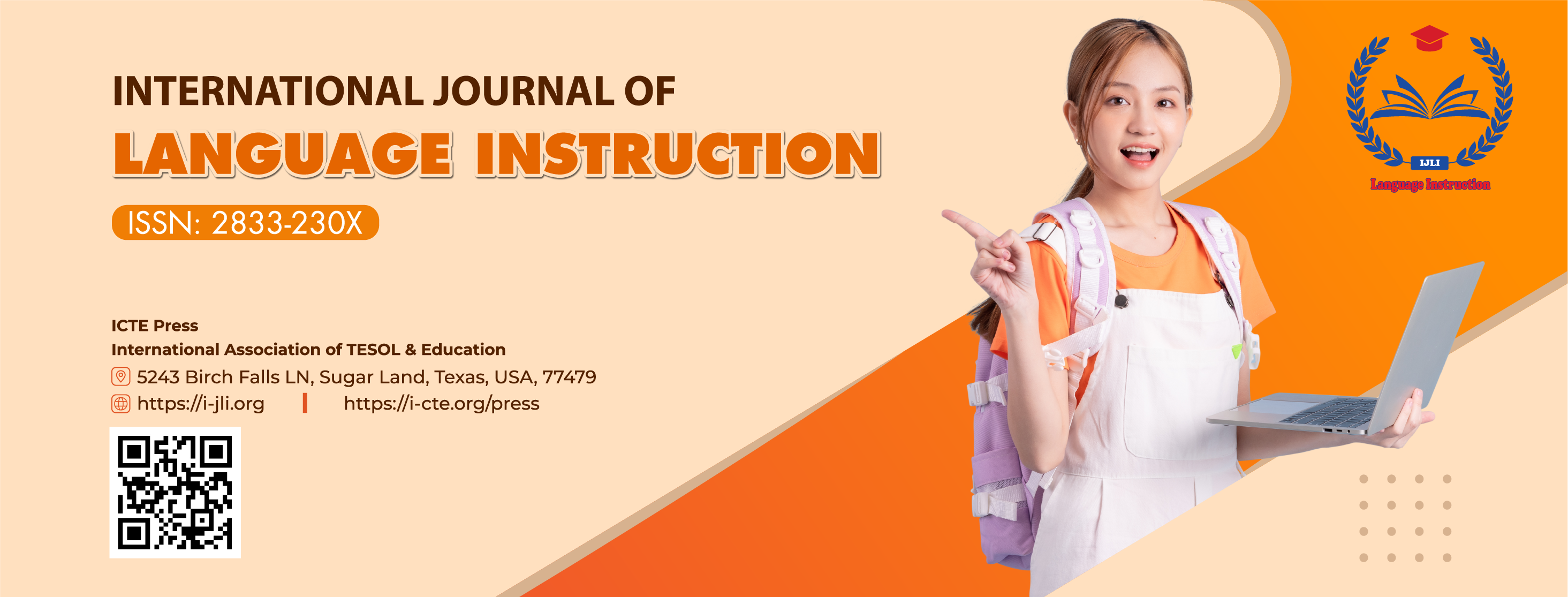The Effect of Video Clips on Students’ Speaking Performances
DOI:
https://doi.org/10.54855/ijli.23214Keywords:
English speaking, role-play, technology, video-based instructionAbstract
The literature review is aimed at enhancing the quality of speaking English learning through video clips. The paper's objectives are to use technology to stimulate students’ interest in learning English and to how teachers accelerate students’ speaking English learning in their classroom. One of the reasons is that frameworks of language function constrain the design of teaching methods and curricula, and so this skill is often only used as a motivator or to enrich language teaching activities. The participants are one hundred eleven students at Thanh Loc high school 11th Grade and Five English Teachers. Data collection includes analyzing and discussing the obtained data in light of the theoretical basis of combining teaching speaking skills to develop inter-communication competence for learners, and the teacher makes specific recommendations on classroom teaching design and the professional development of learners in the file of technology.
References
Alabsi, T. A. (2016). The Effectiveness of Role Play Strategy in Teaching Vocabulary. Theory and Practice in Language Studies, 6(2), 227. https://doi.org/10.17507/tpls.0602.02
Baile, W. F., & Blatner, A. (2014). Teaching Communication Skills: Using Action Methods to Enhance Role-play in Problem-based Learning. Simulation in Healthcare: The Journal of the Society for Simulation in Healthcare, 9(4), 220–227. https://doi.org/10.1097/SIH.0000000000000019
Fraenkel, J. R., Wallen, N. E., & Hyun, H. H. (2012). How to design and evaluate research in education (8th ed). McGraw-Hill Humanities/Social Sciences/Languages.
Gudu, B. O. (2015). Teaching Speaking Skills in English Language using Classroom Activities in Secondary School Level in Eldoret Municipality, Kenya.
Kaharuddin, K., & Rahmadana, A. (2020). Problem-based group discussion: An effective elt technique to improve vocational high school students’ transactional speaking skills. Jurnal ilmu budaya, 8(2), 247–258. https://doi.org/10.34050/jib.v8i2.11032
Krebt, D. M. (2017). The Effectiveness of Role Play Techniques in Teaching Speaking for EFL College Students. Journal of Language Teaching and Research, 8(5), 863. https://doi.org/10.17507/jltr.0805.04
Kuśnierek, A. (2015). Developing students’ speaking skills through role-play. 39.
Le, T. N. H. (2022). A Study on Code-Switching in Oral and Texting Interaction and Communication of University Lecturer and Students. International Journal of TESOL & Education, 2(3), 149–166. https://doi.org/10.54855/ijte.222310.
Liu, F., & Ding, Y. (2009). Role-play in English Language Teaching. Asian Social Science, 5(10), p140. https://doi.org/10.5539/ass.v5n10p140
Nguyen, H. M. P. (2022). Using Scaffolding to Improve Online Group Presentation in English Literature Classes: An Action Study at Van Lang University. International Journal of TESOL & Education, 2(4), 21–31. https://doi.org/10.54855/ijte.22242.
Pham, V. P. Ho, & Nguyen, T. T. Hong (2019). The Effects of Peer-Video Recording on Students’ Speaking Performance. International Journal of English Linguistics, 9(4), https://doi.org/10.5539/ijel.v9n4p178
Pinatih, I. G. A. D. P. (2021). Improving Students’ Speaking Skill through Role-Play Technique in 21st century. Journal of Educational Study, 1(2), 95–100. https://doi.org/10.36663/joes.v1i2.159
Saeed, K. M., Khaksari, M., Eng, L. S., & A M A. (2016). The Role of Learner-learner Interaction in the Development of Speaking Skills. Theory and Practice in Language Studies, 6(2). https://doi.org/10.17507/tpls.0602.03
Shih, R.-C. (2010). Blended learning using video-based blogs: Public speaking for English as a second language students. Australasian Journal of Educational Technology, 26(6). https://doi.org/10.14742/ajet.1048
Shrosbree, M. (2021). Digital video in the language classroom. The JALT CALL Journal, 4(1), 75–84. https://doi.org/10.29140/jaltcall.v4n1.56
Stokoe, E. (2011). Simulated Interaction and Communication Skills Training: The ‘Conversation-Analytic Role-Play Method’. In C. Antaki (Ed.), Applied Conversation Analysis (pp. 119–139). Palgrave Macmillan UK. https://doi.org/10.1057/9780230316874_7
Yükseli, C., & Şevki Kömür. (2017). Using online videos to improve speaking abilities of EFL learners. https://doi.org/10.5281/ZENODO.495750
Downloads
Published
Issue
Section
License
Copyright (c) 2023 Dinh Thi Hong Thuy

This work is licensed under a Creative Commons Attribution 4.0 International License.
The copyright of all articles published in the International Journal of Language Instruction (ijli) remains with the Authors, i.e. Authors retain full ownership of their article. Permitted third-party reuse of the open access articles is defined by the applicable Creative Commons (CC) end-user license which is accepted by the Authors upon submission of their paper. All articles in the ijli are published under the CC BY-NC 4.0 license, meaning that end users can freely share an article (i.e. copy and redistribute the material in any medium or format) and adapt it (i.e. remix, transform and build upon the material) on the condition that proper attribution is given (i.e. appropriate credit, a link to the applicable license and an indication if any changes were made; all in such a way that does not suggest that the licensor endorses the user or the use) and the material is only used for non-commercial purposes.
Authors are able to enter into separate, additional contractual arrangements for the non-exclusive distribution of the journal's published version of the work (e.g., post it to an institutional repository, in a journal or publish it in a book), with an acknowledgment of its initial publication in this journal.











